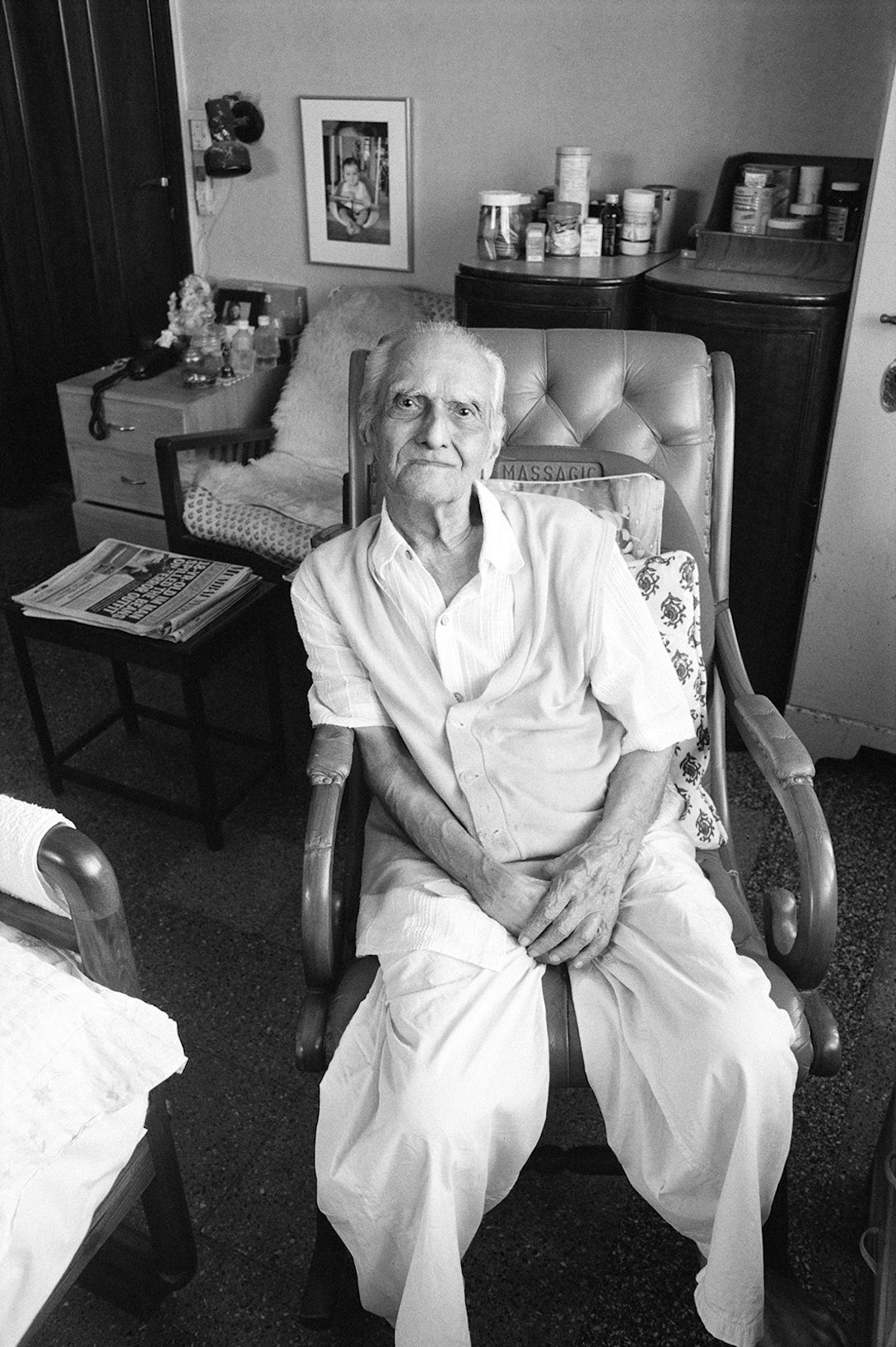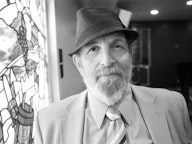
Ramesh Balsekar
Mumbai, India
NO MORE ENLIGHTENMENT
For 35...40 years I pursued enlightenment...sort of a deep, almost unconscious seeking of enlightenment. It ended in frustration because not even my guru or anybody could give me answers to two basic questions: What am I looking for—enlightenment—but what is enlightenment? More important: What will enlightenment do for me if and when I get it?
But when I asked my guru, he got angry because he thought I was questioning his enlightenment. Then he saw that many up there were waiting for his answers to: ‘What is enlightenment?’ and ‘What will it do for me?’
So he calmed down, and he gave me an answer which I knew would come. ‘You will know what enlightenment is and what it does for you only when you are enlightened. To know the sweetness in the mango we have to eat it.’
That is the classical escape route.
The basic question is, ‘What do I, Ramesh, want in this life?’ in the circumstances in which I was placed, over which I never had any control. And honestly, the answer to that is enlightenment...which I came to know when I retired at 60 and said, ‘No more enlightenment for me. Stupid!’ All I want for the rest of my life—however short or long it is—is happiness. Happiness for Ramesh! The ego; selfish, yea. Therefore, I thought, ‘Pursue happiness.’ And I got it. Or rather, it was my destiny to get it.
So, what I'm going to do is try to tell you the process in which this happened. First, I decided what it was that I wanted. From the beginning: happiness. But surely I knew what enjoyment was. I may not have enjoyed all of the enjoyments in life, but I still knew what was enjoyment. That is the opposite of pain. So, I know what enjoyment is, and yet I’m seeking happiness. Therefore, the most important question to start with is: ‘What is this happiness I’m seeking?’ which has to be totally different from the enjoyment I’ve had as [it has been] all my life. You know what I mean? And that was the most important question: ‘What is the happiness?’
I decided, [it was] foolish to seek happiness. I have to [actually] be satisfied with accepting the pleasure when it happens, enjoy it, suffer the pain when it happens.
Then an important question arose [and] at that point I had a...something [a voice] from outside... that only means God. So, what came to me from outside was: ‘You’re wrong! It has never been my intention for the human being to suffer. It has always been that the human being, the birthright of the human being, is the happiness which he is seeking. Only thing is, that happiness is based on one factor which the human being has not accepted. That’s why he is not happy.’
And then I happened to come across four beautiful words from the Bible which I had come across hundreds of times before but they made no real impression on my heart. In fact, the heart said, ‘Stupid.’ And [the words were]: ‘Thy will be done.’ Now it went straight to my heart. I said, ‘How fantastic! That is true!’ I may want something, you may want something, but who will get it does not depend on his effort. Ultimately, it is God’s will, or the will of the Source.
And then I remembered the words in the Bhagavad Gita [about murder, when it happens as a natural consequence, such as in battle]. Therefore, ‘Thy will be done’ is not strictly correct [because] ‘thy will’ has been done. Therefore, the movie is already in the can. What we are still viewing is the same movie, but frame-by-frame-by-frame, day-by-day, hour-by-hour, second-by-second. But, even the physicist has accepted that with the Big Bang, the entire manifestation was created as a block; physicists say, ‘as a block.’ The fan, when it’s working at the highest speed, you may feel the air, but you can’t really see [the air]. And the slower the fan, the more clearly we see the blades.
So, that was the end of my search.
Daniel’s Reflection
I met the world famous teacher, Ramesh Balsekar, at a daily satsang gathering in his home in Mumbai in 2008. It was the only Portraits in Faith interview that I’ve conducted in front of a crowd—a crowd made up of both locals and foreigners who for decades would gather daily in his apartment. Apparently, Ramesh had a saying: “No one is invited and everyone is welcome!” Even Leonard Cohen was a visitor many times when he would drop in and out of Mumbai.
Ramesh Balsekar’s journey was actually a combination of business and spirituality. In his business career, he was president of the Bank of India. But he was also a spiritual seeker and, during his career, he wished to achieve enlightenment. Frustrated with his search, he decided at retirement to be selfish and pursue happiness instead. What followed was that Ramesh experienced enlightenment!
Ramesh taught nonduality, a concept of the Advaita Vedānta school of Hindu philosophy. Duality describes the difference between natural (earthly) and Divine (as from God) laws. The idea of free will is based on the idea that God and man are separate entities, but if a part of God is a component of each human, then the human and God are partners in making choices and experiencing consequences. The idea of “nondual” exists in almost every religion and tradition, including Islam, which has the concepts of fana (annihilation of the self) and wahddat al-wujud (unity of existence). In Judaism, we have the Kabbalistic concept of ein sof (without end, infinite), which is inseparable from all of creation and existence.
Reflecting on my encounter with Ramesh has given me an opportunity to contemplate why spiritual seekers have been obsessed with enlightenment. What is true about humans that makes enlightenment a worthy goal?
Here is my take on it. Human beings developed a prefrontal cortex which enables abstract thought, especially thinking about the past and the future. But the prefrontal cortex comes with another human trait, namely obsessing about the past and future and about ourselves. Primary among these obsessions are death and our own mortality. And if we don’t have something in the past or future to obsess about, we obsess about obsessing! So religion and spirituality help us deal with these obsessions, become more present to reality, and be helpful to others. Spiritual enlightenment is the ultimate release from the mental suffering that’s built into every human being.
In Hinduism, the term most associated with what we in English call enlightenment is moksha, and in Buddhism it is the word nirvana. In Sanskrit, moksha has various meanings related to spiritual freedom from birth, death, and rebirth rotations. This kind of freedom allows self-realization—a better understanding of what it means to be a human extension of God.
I found this other explanation of what happens in enlightenment from Gary van Warmerdam, author of MindWorks: A Practical Guide for Changing Thoughts, Beliefs, and Emotional Reactions, on his website, www.pathwaytohappiness.com. He likens enlightenment to being at a party and realizing everyone is in costume:
“When you have the spiritual awakening of enlightenment it is like seeing the funniest joke ever played. It appears that you are at a costume party and everyone is role playing the character they dressed up as. Except their costume is the personality made up of all their beliefs about what they are, should be, shouldn’t be, should do, and shouldn’t do. Their personality mask is a big set of agreements about themselves. The most hysterical part is that behind the mask is actually a being of infinite consciousness that is wearing the personality.
“The Infinite Consciousness is so powerful that their intent to play the personality role at the party of life keeps them in the role for years, sometimes even a whole life time. In this way they have completely thrown themselves into the role of their costumed personality. They are acting in a silly personality of pretend and are ignoring the consciousness and power of their Divine make up.”
It seems that all of us should seek enlightenment, but like Ramesh’s experience it does not appear to be something for which we can use willpower to achieve! In fact, it is the opposite of willpower— complete acceptance and grace—that Ramesh said is what leads to this deep peace. There are three stages of a spiritual awakening I've seen from people I interviewed around the world, and read in stories written by great sages: 1) acceptance of reality, 2) a feeling of connection to all other souls, and 3) a belief that we are both infinitely significant and infinitely insignificant.
One of the most famous statements about enlightenment is how it transforms all of you but changes nothing in terms of the requirements of daily living. A Buddhist who practiced Zen named Layman Pang (740-808) wrote:
“My daily activities are not unusual,
I’m just naturally in harmony with them.
Grasping nothing, discarding nothing.
In every place there’s no hindrance, no conflict.
My supernatural power and marvelous activity:
Drawing water and chopping wood.”
Over time, this thought became the koan: “Before enlightenment; chop wood, carry water. After enlightenment; chop wood, carry water.” A human’s pre-enlightenment status is that of being a slave to the requirements of wood and water to sustain life. After being enlightened—knowing you are one with everything—chopping and carrying is still the same, only there is no thought of being enslaved.
Returning to Judaism, the tradition in which I was raised and still identify, I am delighted to see the concept of enlightenment tied to the coming of the Messiah (or the Messianic Age, as more progressive Jews refer to it). As humanity prepares to meet the Messiah, we are learning to see and appreciate the Divinity that is already present, and work towards improving ourselves. We get a deeper view of the Jewish idea of enlightenment in Maimonides’ Mishneh Torah Laws of Kings (12:5) where he writes an eloquent description of what it will be like when the Messiah comes: “And at that time there will be no hunger or war, no jealousy or rivalry. For the good will be plentiful, and all delicacies available as dust. The entire occupation of the world will be only to know G-d. ... Israel will be of great wisdom; they will perceive the esoteric truths and comprehend their Creator's wisdom as is the capacity of man. As it is written: ‘For the earth shall be filled with the knowledge of G-d, as the waters cover the sea….’”
So it seems that enlightenment is not something I can search for like Buddha did under the Bodhi tree, but receiving enlightenment is really a matter of grace—up to the will of God, and the Universe. Ramesh Balsekar, because he taught that all of life is predestined, would say that achieving enlightenment is predestined to happen—or not. I am inspired by Ramesh’s teachings that complete acceptance is necessary to lessen suffering, and that all of life is non-dual and therefore sacred. I personally prefer the understanding offered by my friend and Enneagram teacher, Ron Esposito, that I can do the footwork for an enlightened life by observing my habitual behaviors, my thinking, and my feelings, which cause me to react to life without the fullness of compassion for myself or others. The more work I do to get outside the self and place myself in a position to be of service to others, the more I help usher in a world where humanity experiences emotional healing and we enter into a higher level of existence.
I am so grateful to Ramesh Balsekar for the way he blended a life of business and spiritual exploration and teaching. Ramesh died in 2009, just one year after I interviewed him. He continued to hold daily satsang in his apartment in Mumbai until just before his death. May his soul be at peace.
REFERENCES & PERMISSIONS
van Warmerdam, Gary. MindWorks: A Practical Guide for Changing Thoughts, Beliefs, and
Emotional Reactions. www.pathwaytohappiness.com
Permission to quote text from this website was given to the author by Gary van Warmerdam
on January 18, 2021.
Pang, Layman. Zen koan provenance:
www.buddhism.stackexchange.com/questions/15921/what-is-the-meaning-of-the-zenquotebefore-enlightenment-chop-wood-carry-wat
Explore the portraits by theme
- happiness
- grief
- faith
- addiction
- sexuality
- sobriety
- transgender
- alcoholism
- suicide
- homelessness
- death
- aggression
- cancer
- health
- discipline
- abortion
- homosexuality
- recovery
- connection
- enlightenment
- indigenous
- depression
- meditation
- therapy
- anger
- forgiveness
- luminaries
- interfaith
- worship
- salvation
- healing

